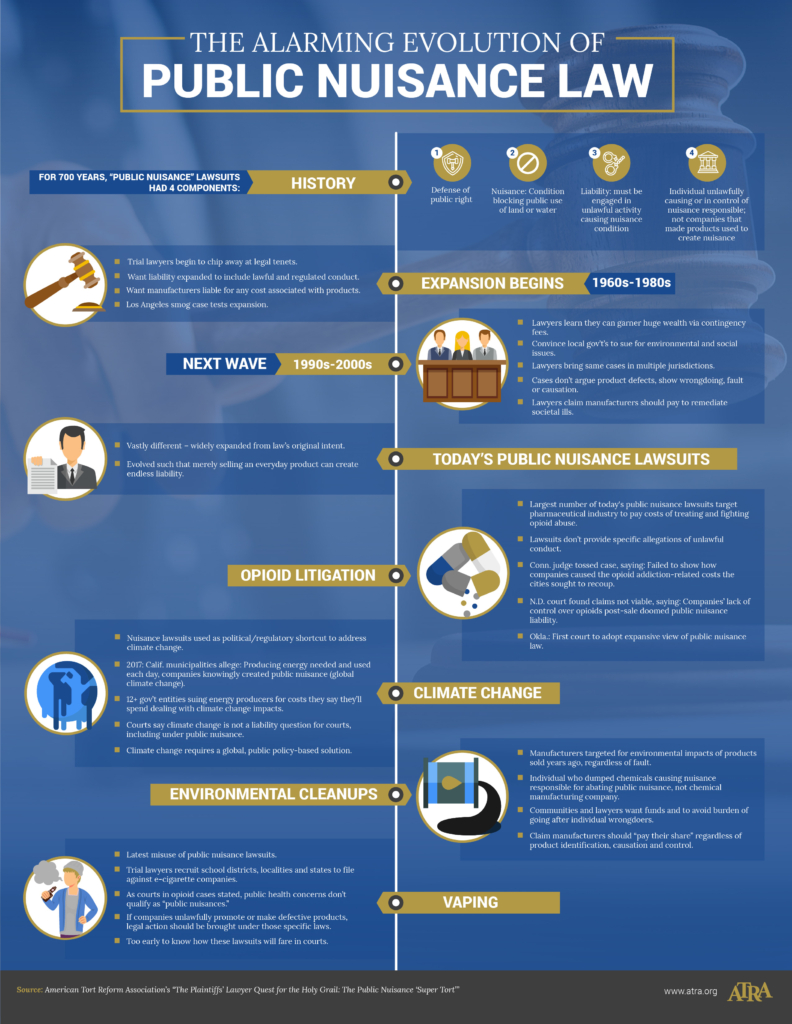
The Alarming Evolution of Public Nuisance Law
An alarming new trend reveals a little-known legal tool is being utilized as the basis to pin the blame on businesses for societal ills, including COVID-19. The trend is driven by attorneys who claim to represent the broader public interest, but their cases often fail to prove who actually is at fault or possibly caused the harm in question.
Lawyers pitch their services and potential lawsuits to state and local government officials and others on a “contingency fee” basis. In doing so, they employ a centuries-old legal theory known as “public nuisance” in order to sue companies for allegedly causing various environmental and social harms.
On April 23, 2020 a lawsuit filed in federal court alleged a food manufacturing plant created a “public nuisance” in continuing its operations during the COVID-19 outbreak.
Today’s public nuisance lawsuits are vastly different and widely expanded from the legal theory’s original intent. It has evolved such that merely selling an everyday product can create virtually unlimited liability.
Today’s most common public nuisance lawsuits include:
- Opioids
- The majority of today’s public nuisance lawsuits are related to opioids. The lawsuits target the pharmaceutical industry to pay costs of treating and fighting opioid abuse. The suits do not allege specific violations of law or unlawful conduct. For this reason, a number of cases have been dismissed by various courts for failing to show how the companies caused the opioid-related harms that are the basis for large financial demands.
- Climate change
- Lawsuits now are being used as a political and regulatory shortcut to solve problems associated with climate change. The lawsuits allege energy companies created a public nuisance by producing energy needed and used by Americans in our everyday lives and in business. More than one dozen governmental entities are suing energy producers on this basis, seeking compensation to address the impacts of climate change. Various courts have found climate change is not a matter for courts to resolve, but instead is a complex global problem requiring a global, public-policy-based solution.
- Environmental and plastic cleanups
- Manufacturers are targeted with lawsuits for the environmental impacts of products sold years ago, regardless of fault. Traditional legal theory would hold that a person or entity that caused the public nuisance ought to be responsible for abating it. The potential legal responsibility for chemicals or products involved in these cases should be based on reliable science and factual evidence, not the financial capacity of the defendant companies.
- E-cigarettes and vape products
- In another recent misuse of public nuisance lawsuits, trial lawyers are recruiting school districts, local governments and states to file lawsuits against e-cigarette companies. Claims alleging a company unlawfully promoted or manufactured defective products should be brought under those specific laws. As the courts have stated in opioid litigation, public health concerns do not qualify as “public nuisances,” but it is too early to know how these lawsuits will fare in the courts.
Read our press release: Lawsuits Look to Place Blame on Industry
Read the full report: The Plaintiffs’ Lawyer Quest for the Holy Grail: The Public Nuisance “Super Tort”
Share on social media:

